Understanding the Foundations of Emotional Openness in Recovery
Long-term sobriety is a multifaceted journey that extends beyond abstinence from substances. Central to this journey is emotional openness—a vital component that fosters genuine recovery, resilience, and well-being. Through exploring emotional sobriety, emotional intelligence, and supportive strategies, we can understand how openness to one's feelings enhances not only personal growth but also sustains lasting recovery.
Defining Emotional Sobriety and Its Roots in Recovery
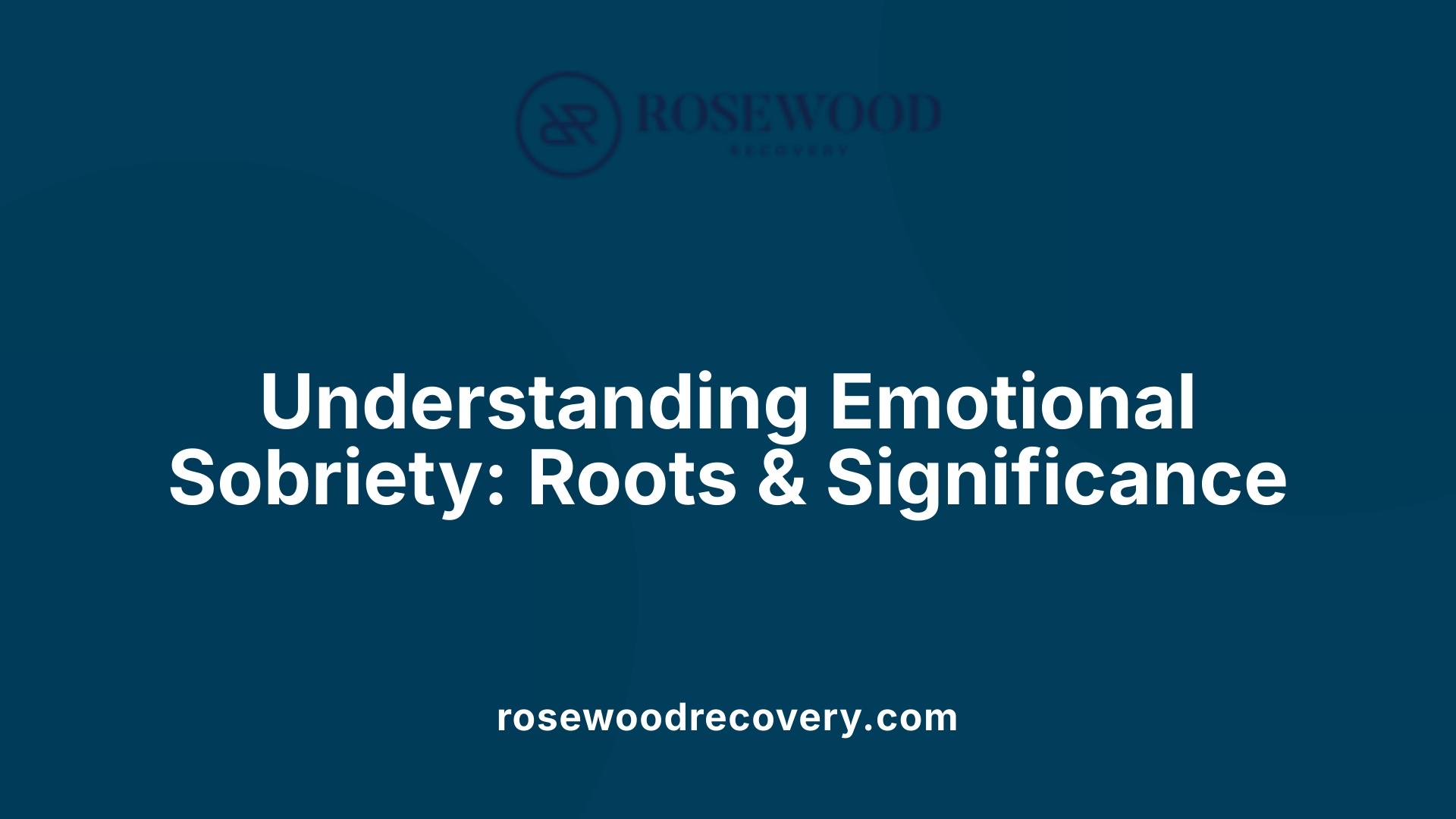
What is emotional sobriety?
Emotional sobriety refers to the ability to effectively manage one’s emotions without resorting to destructive or unhealthy behaviors. It signifies a stage of recovery where individuals achieve a profound psychological and emotional transformation, enabling them to confront both positive and negative feelings with acceptance and resilience. Unlike simply abstaining from substances, emotional sobriety involves feeling and processing emotions without judgment, allowing for inner peace and balanced emotional health.
Historical background and origin of the concept
The idea of emotional sobriety originated in 1953 with Bill W., co-founder of Alcoholics Anonymous. He described it as “freedom from unhealthy dependencies on people and circumstances.” This early understanding highlighted that recovery wasn’t just about avoiding substances but also achieving emotional independence and serenity. Over the years, the concept has expanded to emphasize emotional regulation, resilience, and spiritual growth as vital components of sustained sobriety.
The psychological and spiritual significance of emotional sobriety
Psychologically, emotional sobriety promotes self-awareness, emotional intelligence, and the ability to handle stress and adversity effectively. It helps individuals develop a balanced inner life, reducing the likelihood of relapse triggered by emotional upheaval.
Spiritually, emotional sobriety fosters a deep sense of connection, purpose, and inner peace. Engaging in spiritual practices such as meditation, prayer, or connecting with a higher power provides hope, humility, and acceptance, which are essential for genuine recovery. This holistic approach supports healing beyond mere behavioral change, leading to a profound inner transformation.
Strategies for developing emotional openness during recovery
Developing and maintaining emotional openness involves several practical strategies. Engaging in therapy—such as individual, group, or family counseling—helps address emotional challenges and build coping skills. Techniques like mindfulness, journaling, and reflection increase self-awareness, enabling better understanding and regulation of feelings.
Building a strong support network through groups like AA or NA fosters honest communication, empathy, and connection—crucial elements of emotional openness. Developing emotional intelligence via therapies like Dialectical Behavior Therapy (DBT) and Cognitive Behavioral Therapy (CBT) enhances skills like boundary-setting and effective communication.
Additionally, adopting healthy lifestyle habits—regular exercise, nutritious diet, adequate sleep—and practicing self-compassion reinforce emotional resilience, making it easier to stay open and honest about one’s feelings.
How do psychological and spiritual aspects influence emotional openness?
Psychological and spiritual facets are deeply intertwined in fostering emotional openness. Psychological approaches focus on increasing self-awareness, acceptance, and humility, which create a safe space for authentic emotional expression. Spiritual practices such as meditation or prayer promote inner peace, hope, and connection, encouraging vulnerability and honest sharing.
A holistic recovery that integrates mental health care with spiritual growth enables individuals to experience profound inner changes. These elements together nurture openness by fostering a sense of purpose, forgiveness, and compassion—traits that facilitate deeper emotional honesty and relational authenticity.
Why are emotional maturity and overall well-being vital for long-term recovery?
Emotional maturity involves the development of self-awareness, resilience, and interpersonal skills—all vital for sustained sobriety. Many individuals in recovery may initially struggle with emotional regulation; fostering maturity helps them handle triggers, cravings, and difficult feelings effectively.
Emotional well-being supports mental health, enhances decision-making, and fosters healthy relationships, creating a stable foundation for long-term sobriety. When individuals attain emotional maturity, they can confront life’s challenges with clarity, reducing the risk of relapse rooted in emotional dysregulation or immaturity.
Impact of emotional factors such as emotional sobriety and support networks
Emotional sobriety, reinforced through emotional intelligence and a strong support system, plays a pivotal role in avoiding relapse. Recognizing and managing emotions like anger, sadness, and anxiety diminishes impulsive actions that might lead to substance use.
Support groups, therapy, and community programs provide emotional backing, validation, and shared strategies, making sustained sobriety more attainable. Building emotional resilience through these supports fosters confidence and a sense of control, essential for long-lasting recovery.
How does emotional management contribute to maintaining sobriety?
Effective emotional management, including skills like emotion differentiation—being able to identify and understand complex feelings—and addressing intense emotions such as depression and anger, is crucial in recovery. These skills reduce the likelihood of relapse by preventing emotional overwhelm.
Therapies like DBT and CBT teach individuals to process emotions healthily, develop resilience, and replace maladaptive coping strategies with adaptive ones. Strong social support and emotional awareness further bolster stability, ensuring that emotional challenges do not derail long-term sobriety.
Significance of emotional openness for long-term sobriety and addiction recovery
Being emotionally open facilitates honest relationships with oneself and others. It helps reduce feelings of shame and isolation, which are common in addiction. Openness encourages vulnerability, fostering trust and deeper connections within support networks.
This emotional transparency supports ongoing self-awareness, reduces stigma, and promotes continual growth. Ultimately, emotional openness acts as a powerful tool in maintaining sobriety by reinforcing resilience, accountability, and emotional health.
Relationship between emotional openness and health outcomes in recovery
Greater emotional openness correlates with improved health outcomes by enabling better emotion regulation and reducing emotional dysregulation associated with substance use. Individuals who are open about their feelings tend to access healthier coping strategies, handle negative moods more effectively, and diminish impulsive behaviors.
This openness enhances mental health stability and physical well-being, decreasing relapse risk. Fostering emotional honesty and vulnerability contributes to a more balanced emotional life, supporting sustainable recovery and overall health.
The Psychology and Spirit of Emotional Openness
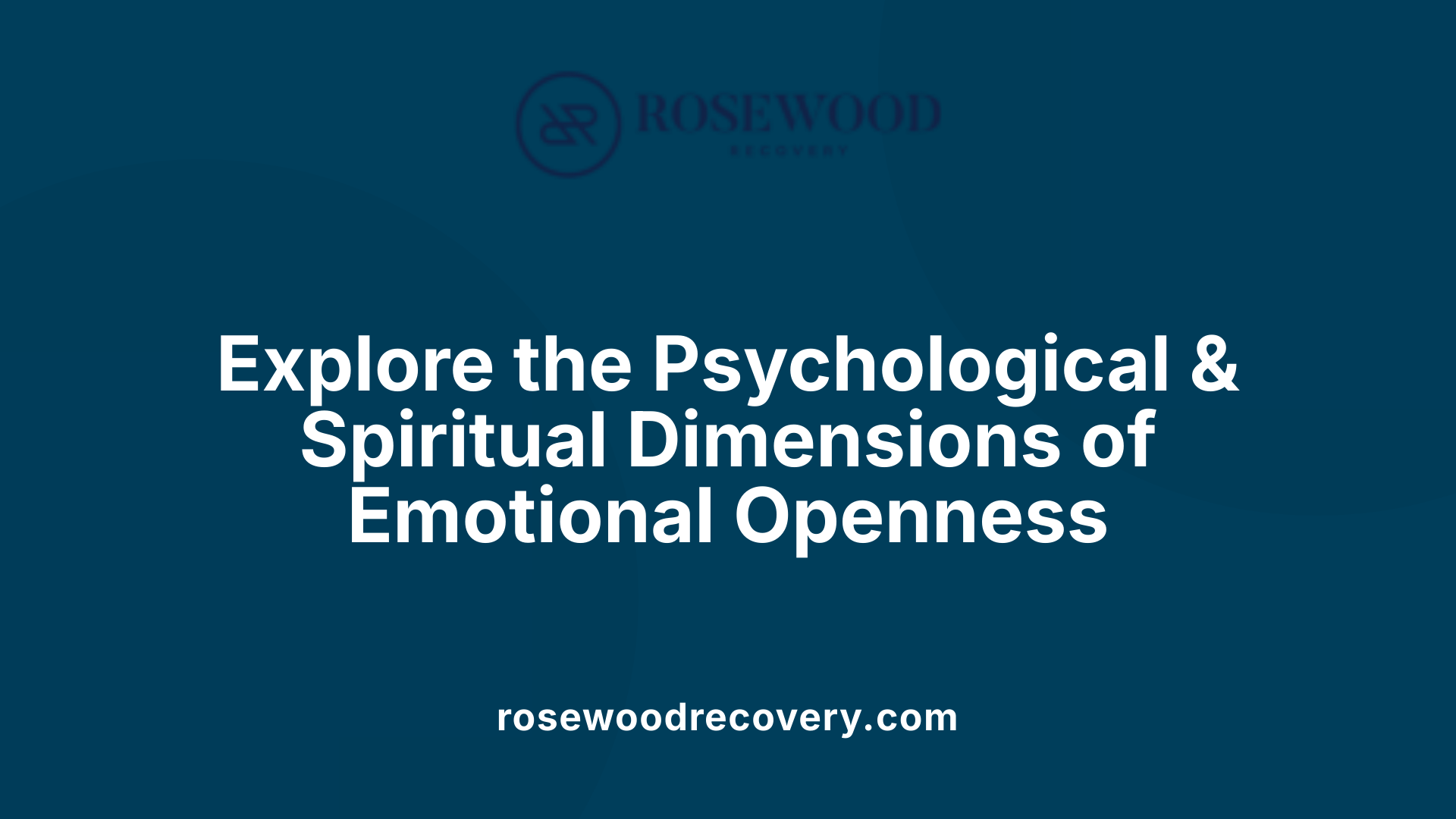
How do psychological and spiritual aspects influence emotional openness in recovery?
In recovery from addiction, fostering emotional openness involves a delicate balance of psychological insight and spiritual growth. Psychologically, therapies like Cognitive-Behavioral Therapy (CBT), Dialectical Behavior Therapy (DBT), and trauma-informed care help individuals develop self-awareness, emotional regulation, and acceptance of their feelings. These practices enable people to confront and process emotions without resorting to substance use.
Spiritually, practices such as prayer, meditation, or connecting with a higher power offer a profound sense of purpose, hope, and inner peace. These elements cultivate humility, compassion, and a sense of connectedness that bolster emotional resilience.
When combined, psychological and spiritual approaches promote genuine vulnerability and honesty. This inner transformation encourages individuals to connect authentically with their feelings and with others, fostering deeper relationships and trust.
A holistic approach that includes mental health care, physical well-being, and spiritual practices broadens recovery beyond abstinence, creating a lasting, heartfelt change. Ultimately, integrating these aspects supports emotional honesty and strength, vital for long-term sobriety and well-being.
What therapeutic approaches emphasize the psychological and spiritual aspects of recovery?
Several therapeutic frameworks integrate psychological and spiritual elements to support recovery effectively. Mindfulness-Based Cognitive Therapy (MBCT) emphasizes present-moment awareness, acceptance, and self-compassion, aligning with spiritual principles of inner peace and self-understanding.
Dialectical Behavior Therapy (DBT) focuses on emotional regulation, distress tolerance, and interpersonal effectiveness, encouraging acceptance and change—concepts rooted in spiritual growth.
Trauma-Informed Care addresses underlying emotional wounds and promotes healing through safety, empowerment, and understanding, often incorporating spiritual practices like meditation or prayer.
Holistic therapies that include yoga, meditation, and connecting with a higher power foster spiritual connection while providing psychological stability. These approaches recognize that emotional healing, psychological resilience, and spiritual awakening are interconnected.
By addressing the root causes of addiction within a spiritual context, these therapies cultivate authentic vulnerability, inner healing, and holistic well-being, which are essential for sustainable recovery.
Building Emotional Maturity for Lasting Sobriety
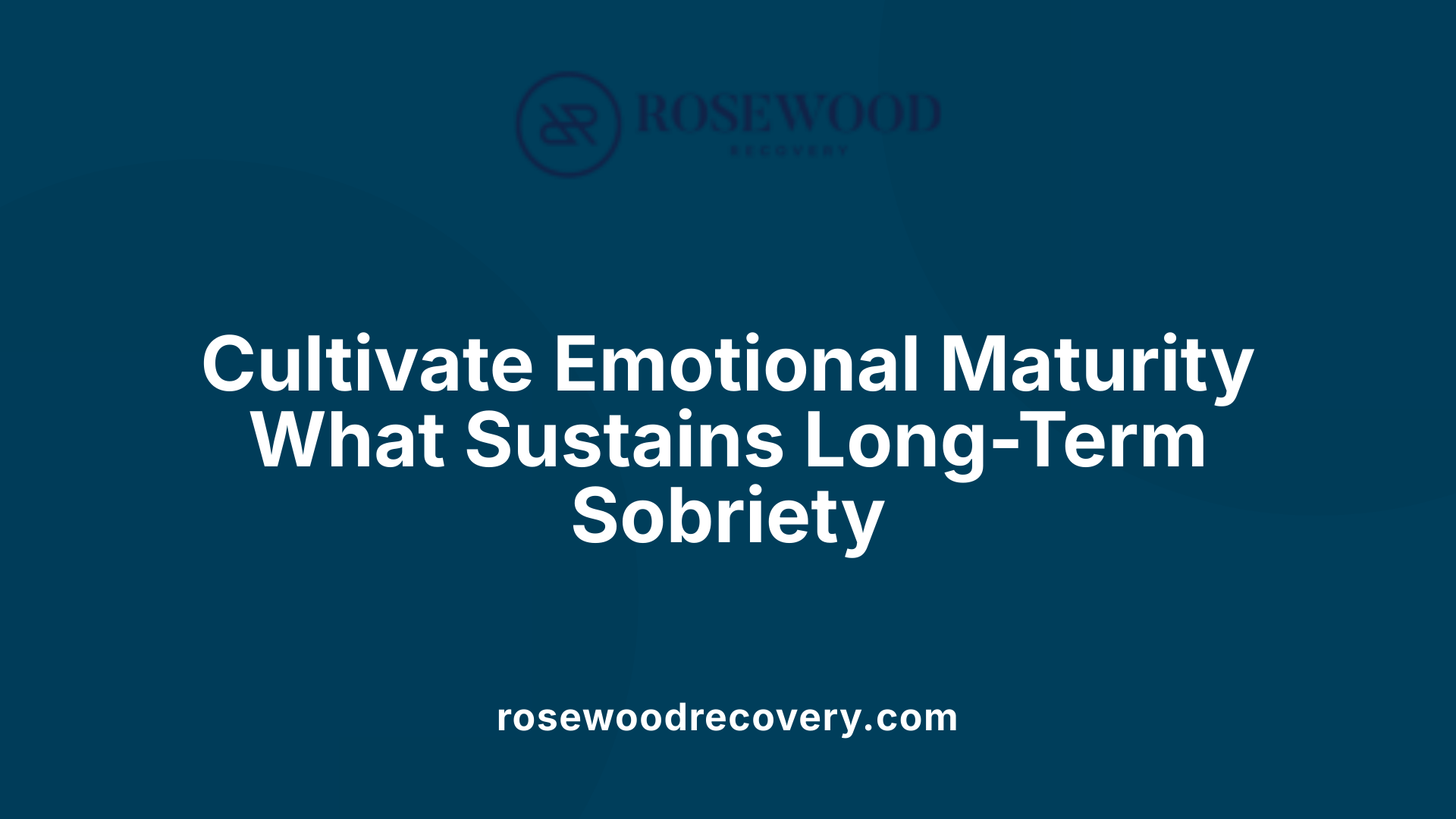
Why are emotional maturity and emotional well-being important for long-term recovery outcomes?
Emotional maturity and emotional well-being are fundamental to sustained sobriety because they empower individuals to manage their feelings effectively. When someone develops emotional maturity, they gain the ability to regulate emotions, handle stress, and bounce back from setbacks with resilience. Addiction often hampers emotional growth, causing individuals to remain emotionally immature and vulnerable to relapse under emotional distress.
Building emotional intelligence through therapy, self-awareness, and supportive relationships helps create a stable emotional foundation. This stability supports healthier decision-making and reduces impulsive behaviors that can lead to relapse. Emotional sobriety—feeling emotions without judgment and without letting them dictate actions—is a hallmark of long-term recovery.
Enhanced emotional health also promotes better relationships and social connections, which are critical in recovery. By addressing and healing underlying emotional issues, individuals foster personal growth and strengthen their support systems. All these factors combined improve mental health outcomes and build resilience, making emotional maturity crucial for maintaining sobriety over the long haul.
| Aspect | Role in Recovery | Details |
|---|---|---|
| Emotional regulation | Prevents relapse | Managing triggers and emotional upheavals effectively |
| Resilience | Bounces back from setbacks | Handling stress, emotional pain, and life challenges |
| Relationship repair | Supports rebuilding trust | Enhances communication, empathy, and forgiveness |
| Personal growth | Promotes healing | Development of self-awareness and positive self-regard |
| Support system | Provides stability | Strong emotional connections foster accountability and hope |
How can emotional maturity be cultivated during recovery?
Developing emotional maturity in recovery is a step-by-step process that involves self-reflection, skill development, and ongoing practice. Engaging in therapy—particularly approaches like Dialectical Behavior Therapy (DBT) and Cognitive Behavioral Therapy (CBT)—can significantly enhance emotional awareness and regulation skills.
Practicing mindfulness and emotional regulation techniques such as deep breathing, meditation, and journaling helps individuals observe their feelings without acting impulsively. Embracing accountability means acknowledging mistakes, accepting responsibility, and seeking growth from experiences.
Overcoming emotional barriers like shame or fear of vulnerability is essential. Creating a safe space through open communication and honesty with oneself and others fosters this process.
Maintaining routines of self-care—including physical activity, proper nutrition, and restful sleep—supports emotional health. Setting realistic goals and celebrating progress build confidence and patience in emotional development.
Post-recovery, sustaining emotional growth involves community participation—support groups and social connections—and ongoing self-awareness practices, ensuring that emotional maturity continues to develop and strengthen resilience.
| Strategies | Focus Area | Methods |
|---|---|---|
| Therapy | Emotional insights | DBT, CBT, group therapy |
| Mindfulness practices | Emotional observation | Meditation, journaling |
| Accountability | Accepting responsibility | Self-assessment, feedback |
| Self-care | Emotional balance | Exercise, hobbies, social time |
| Community involvement | Support networks | Support groups, peer mentoring |
What role does emotional maturity play in repairing relationships and maintaining sobriety?
Emotional maturity is vital in repairing relationships damaged by addiction. It fosters honest communication, empathy, and forgiveness—traits essential for rebuilding trust and understanding.
Mature individuals are better equipped to confront and process their emotions constructively. This emotional stability reduces conflicts and misunderstandings that often hamper recovery. By being open, honest, and vulnerable, they create healthier interactions that promote healing within family, friendships, and social networks.
This emotional steadiness also provides the resilience needed to face setbacks without resorting to old habits or substances. It helps individuals respond to difficult situations calmly and wisely, decreasing the likelihood of relapse.
Furthermore, emotional maturity enhances self-awareness and responsible behavior, which deepen social bonds. It empowers individuals to maintain their recovery by balancing emotional health with healthy relationship dynamics—crucial for long-term sobriety.
| Relationship Benefit | Effect | Explanation |
|---|---|---|
| Improved communication | Builds trust | Clearer, honest exchanges |
| Empathy | Fosters understanding | Recognizing and respecting others' feelings |
| Forgiveness | Heals wounds | Letting go of resentment and shame |
| Conflict resolution | Reduces disputes | Calm, respectful problem-solving |
| Resilience | Handles setbacks | Maintains sobriety through emotional strength |
Building emotional maturity is an ongoing journey that significantly enhances the quality of recovery and life. It leads to healthier relationships, better coping skills, and a resilient mindset necessary for facing future challenges.
The Interplay of Emotional Regulation and Social Support
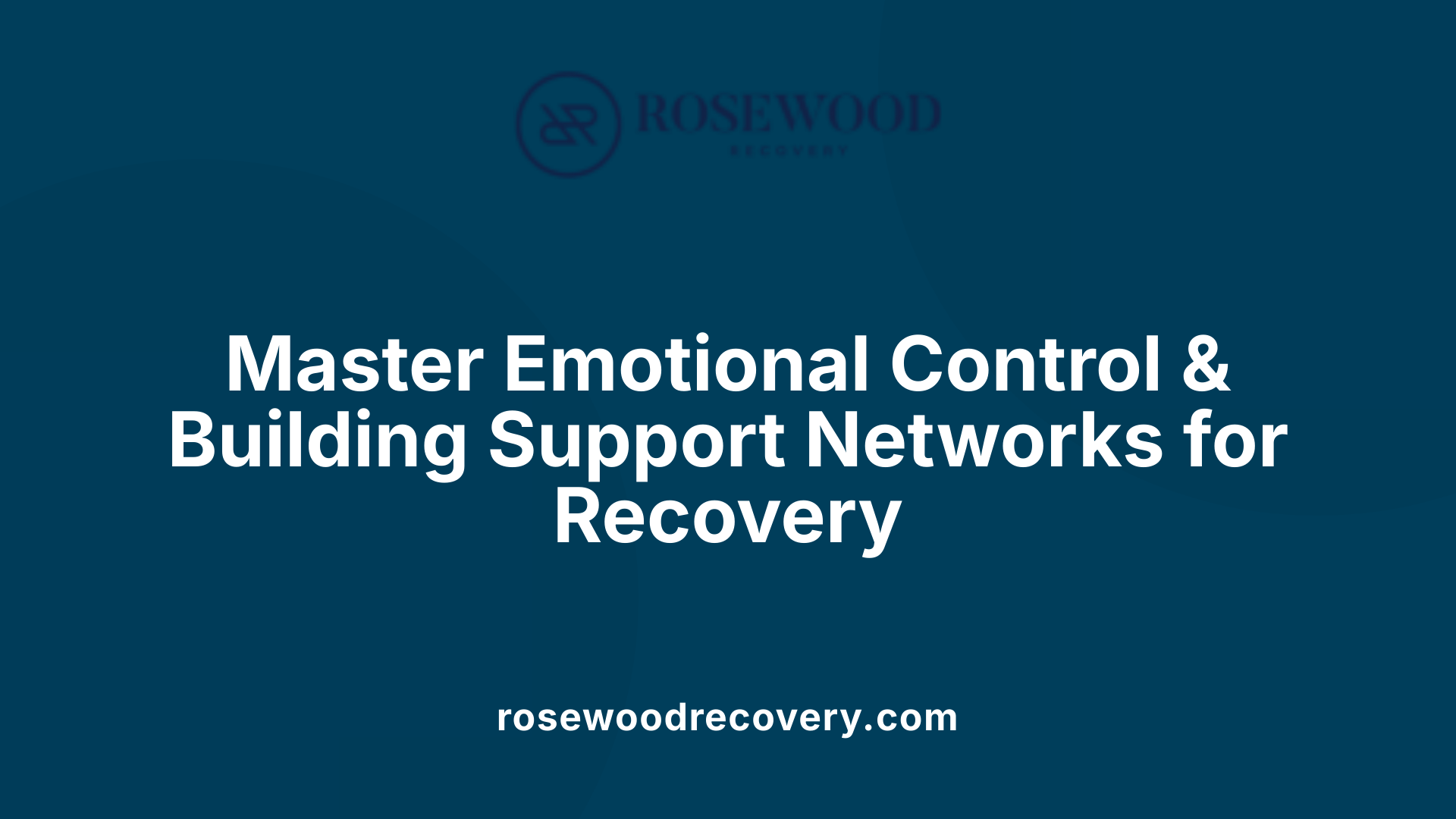
Why is emotional regulation, including emotion differentiation and managing feelings like depression and anger, vital for sustaining sobriety?
Managing emotions effectively is central to maintaining long-term sobriety. When individuals learn to differentiate between types of emotions and address complex feelings such as depression and anger, they can process and respond to these feelings without resorting to substance use. Emotional regulation helps reduce the intensity of overwhelming or maladaptive emotions that often lead to relapse.
Therapies like Dialectical Behavior Therapy (DBT) and Cognitive Behavioral Therapy (CBT) teach skills such as mindfulness, impulse control, and emotional awareness. These tools enable individuals to navigate emotional upheavals more resiliently.
Moreover, fostering emotional connections through supportive relationships enhances feelings of acceptance, understanding, and belonging. This emotional support lessens loneliness and provides a buffer against stressors that could trigger relapse.
In essence, integrating emotional regulation skills into recovery helps address underlying mental health issues, stabilizes mood and behavior, and paves the way for lasting sobriety.
The Long Path to Lasting Sobriety Through Emotional Mastery
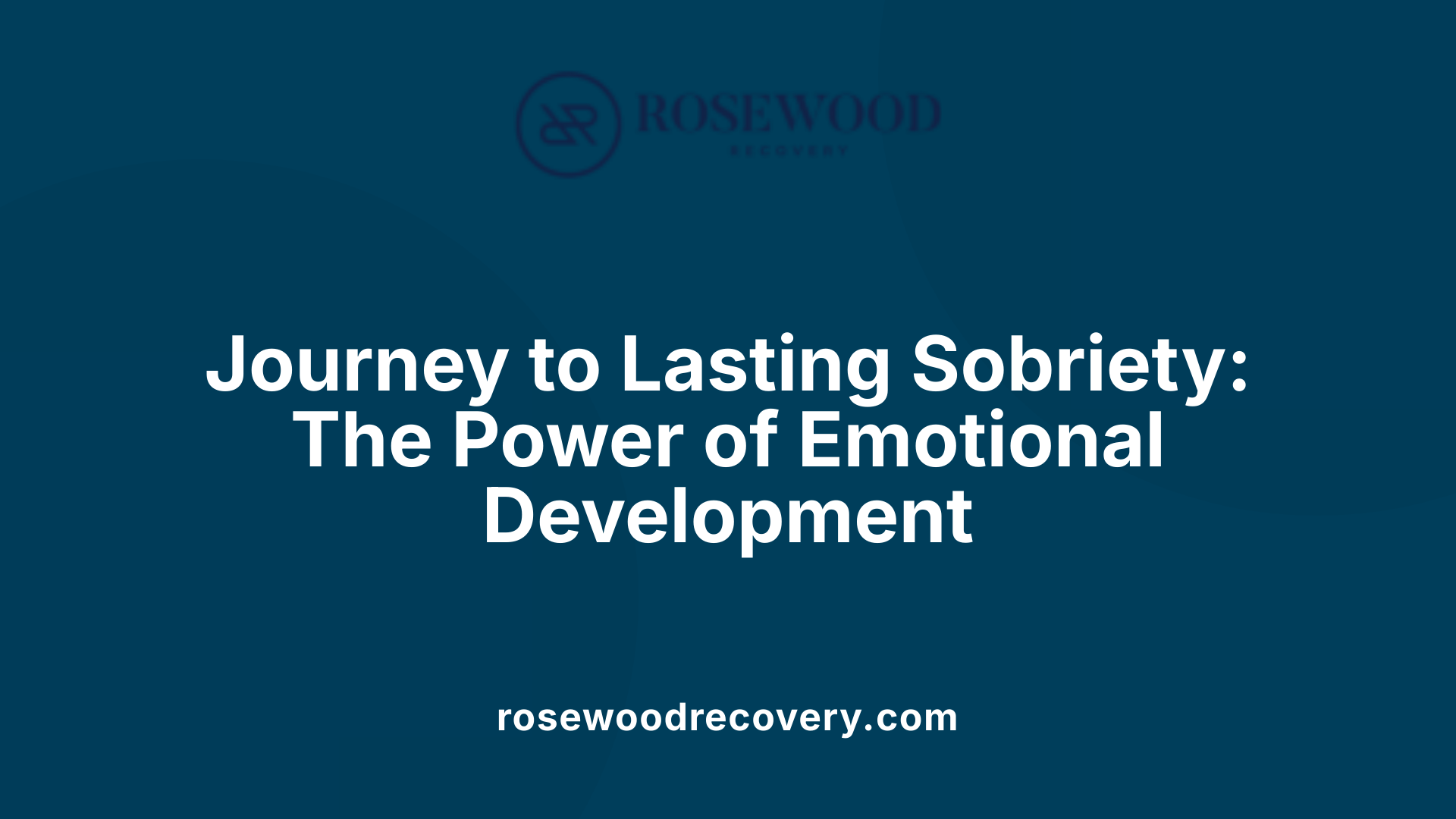
Why is ongoing emotional development essential after achieving initial sobriety?
After conquering the immediate challenges of addiction, sustaining long-term sobriety hinges on continued emotional growth. Recovery is not just about abstaining from substances but also about cultivating emotional resilience, maturity, and openness. Developing these emotional skills helps individuals navigate inevitable life stressors, relationship dynamics, and internal struggles without relapse.
Maintaining emotional well-being involves regular self-awareness practices, such as mindfulness meditation and journaling. These activities promote recognition and understanding of emotional patterns, empowering individuals to respond healthily to triggers or negative feelings.
Support systems like therapy groups, family, and friends are crucial. They provide acceptance, validation, and guidance, reinforcing emotional connections that foster a sense of belonging and reduce feelings of isolation. Engaging in community activities and support groups like AA or NA sustains motivation and provides a shared space to exchange coping strategies.
Physical health also plays a role—balanced nutrition, regular exercise, and sufficient sleep regulate mood swings and boost mental resilience. Complementary spiritual practices, such as prayer or spending time in nature, help nurture inner peace.
Lastly, embracing ongoing learning about emotional intelligence and vulnerability encourages continual growth. With consistent effort in these areas, individuals fortify their emotional defenses, reducing the risk of relapse and reinforcing a sustainable path to sobriety.
What strategies help preserve emotional well-being in the long-term?
Long-term emotional health relies on deliberate strategies. Continuous self-awareness allows individuals to understand the nuances of their emotional responses. Mindfulness meditation, for example, enhances present-moment awareness and reduces impulsivity.
Support engagement follows naturally—participating in ongoing therapy or support groups provides ongoing validation and accountability. Building and maintaining trusting relationships with family and friends help create a supportive environment where emotional sharing is safe and encouraged.
Adopting healthy stress management techniques such as deep breathing, yoga, or engaging in hobbies can prevent emotional overwhelm. Setting realistic goals and celebrating small successes reinforce confidence.
Practicing self-compassion and forgiving oneself for setbacks cultivates a resilient mindset. Staying open to learning about emotions, whether through books, seminars, or workshops, enables continuous growth.
Moreover, integrating physical and spiritual wellness practices sustains inner stability, making emotional health a daily priority.
How does continuous self-awareness and community involvement support emotional stability?
Self-awareness is the foundation of emotional stability. It allows individuals to identify triggers, understand underlying feelings, and choose appropriate responses rather than reactive behaviors. This ongoing internal dialogue is vital for emotional regulation.
Community involvement amplifies this effect by offering external validation, shared experiences, and collective wisdom. Support groups like AA and NA are rich resources for emotional connection, encouragement, and accountability. These groups foster a sense of belonging, which is fundamental in combating loneliness and shame often associated with addiction.
Furthermore, participating in community activities and maintaining open communication with loved ones foster trust and vulnerability. Such openness encourages emotional honesty, which is a cornerstone of emotional sobriety.
Integrating self-awareness with active community participation creates a resilient support network—an environment where emotional challenges are addressed proactively, reducing the likelihood of relapse and bolstering long-term recovery.
The Vital Role of Emotional Openness in Lasting Sobriety
In conclusion, emotional openness serves as the foundation for successful, long-term sobriety. It empowers individuals to develop emotional maturity, resilience, and meaningful relationships, all of which are essential for navigating the challenges of recovery. By fostering honest expression of feelings, integrating psychological and spiritual growth, and continuously honing emotional regulation skills, those in recovery can achieve a holistic sense of well-being. This ongoing process not only fortifies their defense against relapse but also inspires a deeper, more fulfilling life rooted in self-awareness, compassion, and inner peace. Ultimately, embracing emotional openness is a transformative step toward enduring sobriety and authentic recovery.
References
- Emotional Sobriety in Recovery | Grand Falls
- The impact of emotional well-being on long-term recovery and ...
- The Importance of Emotional Sobriety in Addiction Recovery
- The Importance of Emotional Connection in Addiction Recovery
- The Emotional and Spiritual Components of Sobriety
- The Role of Emotional Resilience in Long-Term Sobriety
- Emotion differentiation in early recovery from alcohol use disorder
- Depression, Anger, & Addiction: The Role of Emotions in Recovery
- The Importance of Emotional Support in Addiction Recovery

.jpeg)

.jpeg)
